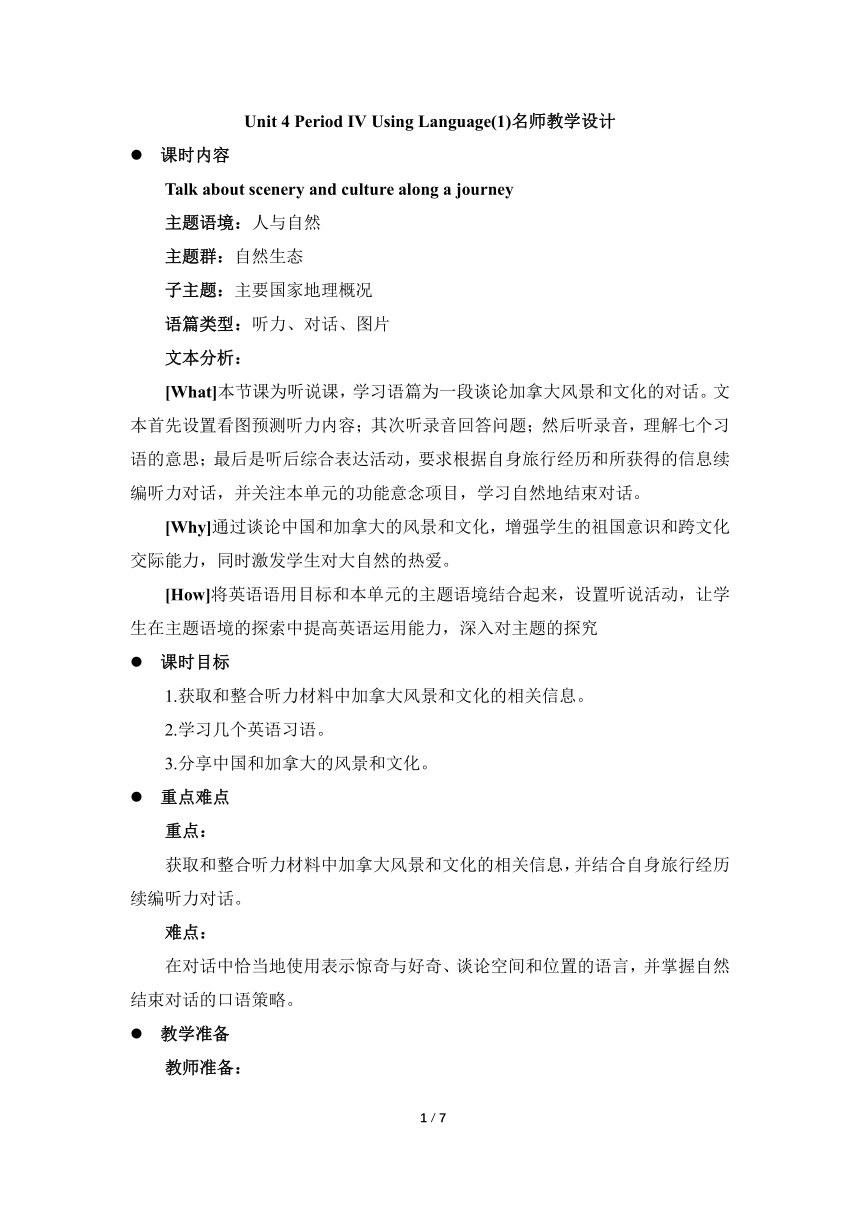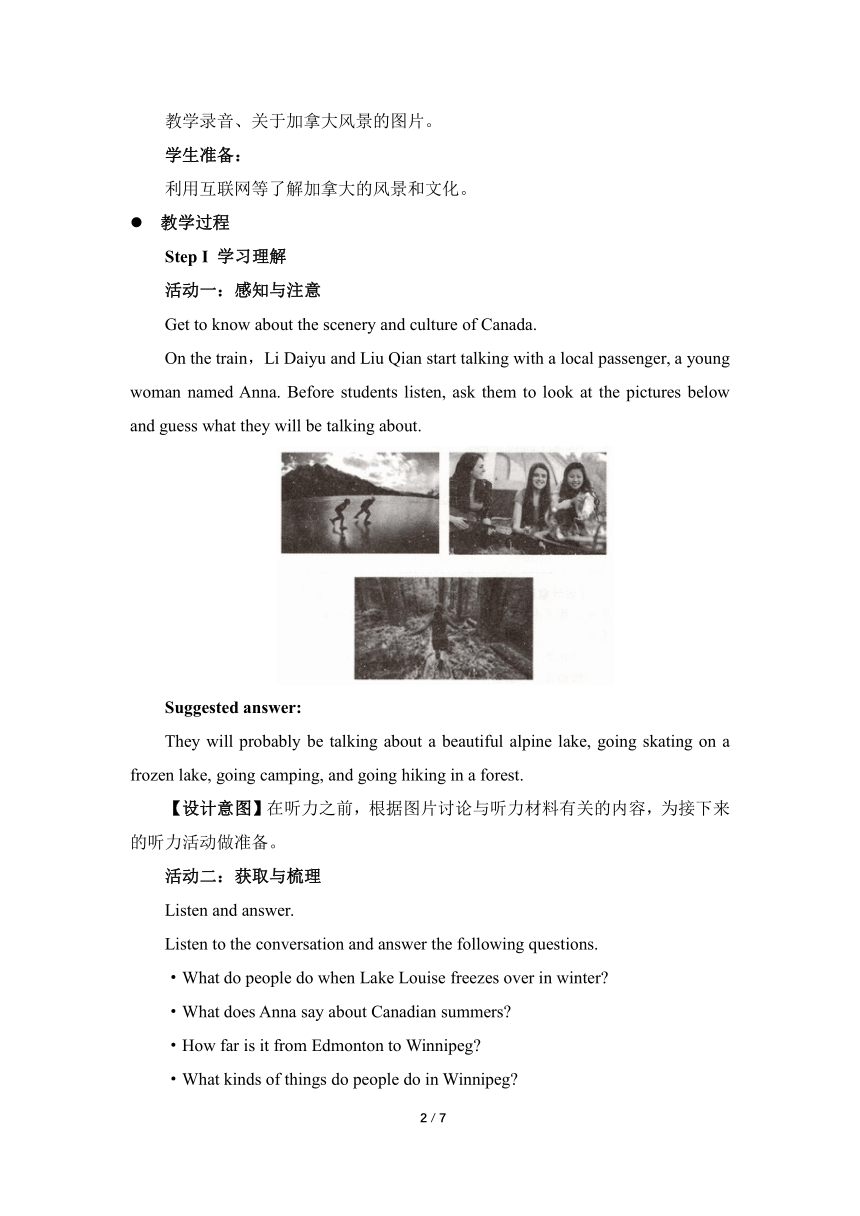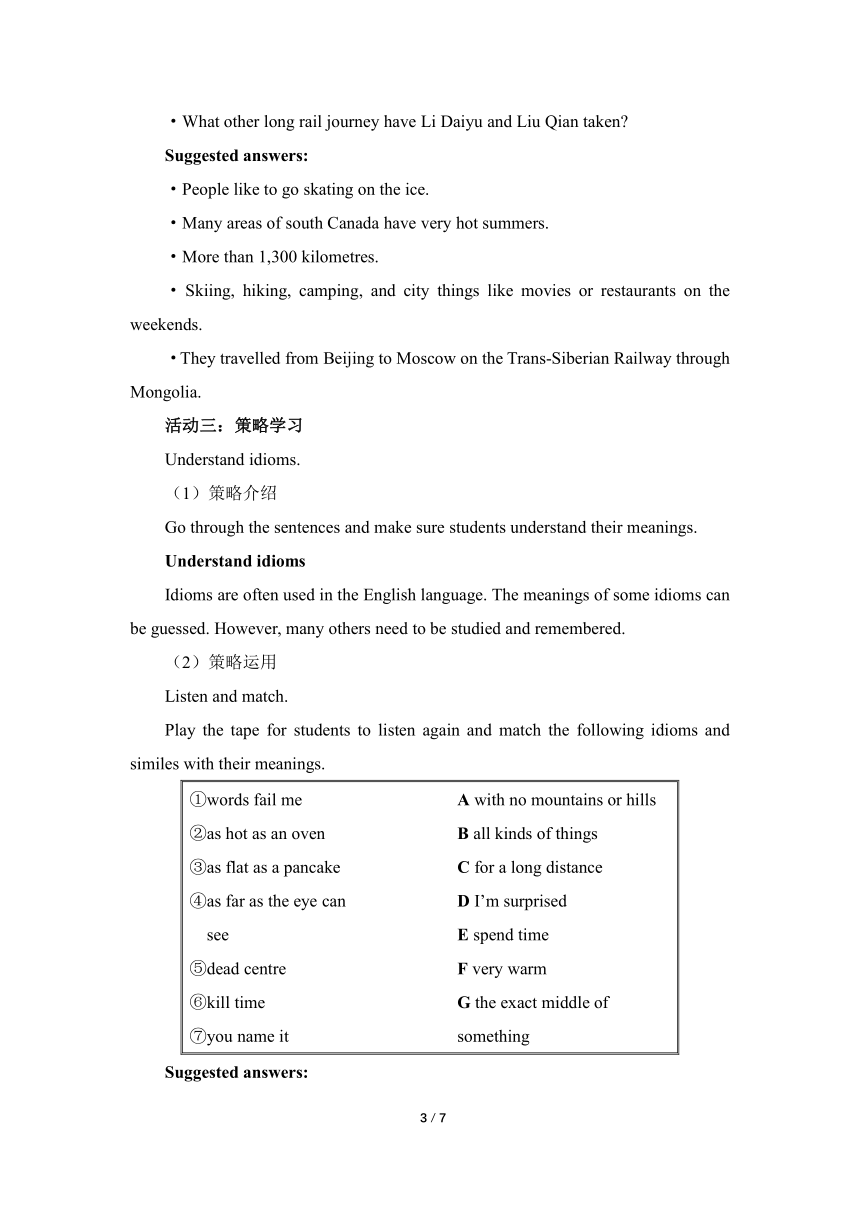人教版(2019)高中英语选择性必修第二册 Unit4 Journey Across a Vast Land Using Language(1) 名师教学设计
文档属性
| 名称 | 人教版(2019)高中英语选择性必修第二册 Unit4 Journey Across a Vast Land Using Language(1) 名师教学设计 |

|
|
| 格式 | docx | ||
| 文件大小 | 491.6KB | ||
| 资源类型 | 教案 | ||
| 版本资源 | 人教版(2019) | ||
| 科目 | 英语 | ||
| 更新时间 | 2023-03-12 18:03:24 | ||
图片预览



文档简介
Unit 4 Period Ⅳ Using Language(1)名师教学设计
课时内容
Talk about scenery and culture along a journey
主题语境:人与自然
主题群:自然生态
子主题:主要国家地理概况
语篇类型:听力、对话、图片
文本分析:
[What]本节课为听说课,学习语篇为一段谈论加拿大风景和文化的对话。文本首先设置看图预测听力内容;其次听录音回答问题;然后听录音,理解七个习语的意思;最后是听后综合表达活动,要求根据自身旅行经历和所获得的信息续编听力对话,并关注本单元的功能意念项目,学习自然地结束对话。
[Why]通过谈论中国和加拿大的风景和文化,增强学生的祖国意识和跨文化交际能力,同时激发学生对大自然的热爱。
[How]将英语语用目标和本单元的主题语境结合起来,设置听说活动,让学生在主题语境的探索中提高英语运用能力,深入对主题的探究
课时目标
1.获取和整合听力材料中加拿大风景和文化的相关信息。
2.学习几个英语习语。
3.分享中国和加拿大的风景和文化。
重点难点
重点:
获取和整合听力材料中加拿大风景和文化的相关信息,并结合自身旅行经历续编听力对话。
难点:
在对话中恰当地使用表示惊奇与好奇、谈论空间和位置的语言,并掌握自然结束对话的口语策略。
教学准备
教师准备:
教学录音、关于加拿大风景的图片。
学生准备:
利用互联网等了解加拿大的风景和文化。
教学过程
Step I 学习理解
活动一:感知与注意
Get to know about the scenery and culture of Canada.
On the train,Li Daiyu and Liu Qian start talking with a local passenger, a young woman named Anna. Before students listen, ask them to look at the pictures below and guess what they will be talking about.
Suggested answer:
They will probably be talking about a beautiful alpine lake, going skating on a frozen lake, going camping, and going hiking in a forest.
【设计意图】在听力之前,根据图片讨论与听力材料有关的内容,为接下来的听力活动做准备。
活动二:获取与梳理
Listen and answer.
Listen to the conversation and answer the following questions.
·What do people do when Lake Louise freezes over in winter
·What does Anna say about Canadian summers
·How far is it from Edmonton to Winnipeg
·What kinds of things do people do in Winnipeg
·What other long rail journey have Li Daiyu and Liu Qian taken
Suggested answers:
·People like to go skating on the ice.
·Many areas of south Canada have very hot summers.
·More than 1,300 kilometres.
·Skiing, hiking, camping, and city things like movies or restaurants on the weekends.
·They travelled from Beijing to Moscow on the Trans-Siberian Railway through Mongolia.
活动三:策略学习
Understand idioms.
(1)策略介绍
Go through the sentences and make sure students understand their meanings.
Understand idioms
Idioms are often used in the English language. The meanings of some idioms can be guessed. However, many others need to be studied and remembered.
(2)策略运用
Listen and match.
Play the tape for students to listen again and match the following idioms and similes with their meanings.
①words fail me A with no mountains or hills ②as hot as an oven B all kinds of things ③as flat as a pancake C for a long distance ④as far as the eye can D I’m surprised see E spend time ⑤dead centre F very warm ⑥kill time G the exact middle of ⑦you name it something
Suggested answers:
①D ②F ③A ④C ⑤G ⑥E ⑦B
【设计意图】播放录音,让学生获取有关加拿大风景和文化的信息,并学习7个英语习语。通过活动,学生运用习语学习策略,获取和整合听力的细节内容,有助于单元主题意义的理解,也有利于口语活动的开展。
Step Ⅱ 应用实践
活动四:分析与判断
Ask students to discuss the following questions in groups.
·What did they talk about in the conversation
·Where have you travelled in China Which place impressed you most
·How would you continue or end a conversation
Suggested answers:
·They talked about the climate and the geography of Canada,certain places in Canada and activities there. Also Li Daiyu and Liu Qian talked about their own travel experiences.
·(略)
·Showing interest is an effective way to continue a conversation. And surely we should end a conversation politely.
【设计意图】在获取加拿大的相关信息后,让学生讲述自己去过的中国旅游景点,并描述给自己印象最深刻的景点;最后讨论如何自然地继续或结束对话。在这个过程中实现所学语言内化,提高学生语言表达能力,深化对主题的认识。
活动五:描述与阐释
Talk about travel both in China and Canada
(1)Learn language.
①Ask students to read the following structures, and make sure they understand their meanings.
Expressing surprise and curiosity Oh, my goodness! /Good heavens! You’re kidding! Are you kidding Are you serious It can’t be true! Oh no! Really What a surprise! I think it’s fantastic! Wow! How interesting/amazing! What was it like
Talking about space and position It’s about… kilometres northeast of… …is close to… in/on/to the north/south/west/east of… across the continent/lake alongside the coast/river go eastwards/westwards/northwards/southwards
Ending a conversation naturally I have to run. Good talking to you. I’ll catch you later. It was good/nice meeting you. I’m sure you want to relax a bit. I’ll let you go. Sorry, I can’t talk longer. I’m actually on my way to… Well, I have to go. I’ll talk to you later.
②Ask students to try to read the above structures over and over again until they can speak fluently.
(2)Sample.
①Pay attention to what they talk about.
Anna: I thought China would be very crowded, given its large population. Daiyu: Well, contrary to what many people believe, there are a lot of vast and empty spaces in China, actually. Anna: That’s great! There must be amazing scenery to see in China then! …
②Learn how to end a conversation naturally.
Anna: Anyhow, the next station is my stop! Take care and enjoy the rest of your trip! Daiyu: Thanks, Anna! Liu Qian: It was really great to meet you! Anna: And it was nice talking to you!
(3)Make a conversation.
Ask students to continue the conversation about Canada and China based on their own travel experiences or the information they heard or read in this unit.
(4)Make a presentation.
Ask some students to make presentations about their conversations.
【设计意图】在口语对话之前,教师提供给学生一些表达吃惊和好奇、谈论空间和位置、结束对话的功能句,学生通过朗读,熟练掌握这些句型,为口语活动提供背景常识和语言结构,使得有话可说。
Step Ⅲ 迁移创新
活动六:想象与创造
Describe travel experiences.
(1)Ask students to think about their own travel experiences.
(2)Have some students make a presentation and report back to the class.
【设计意图】在英语课堂教学中,设定特定的场景,让学生讲述自己的旅游经历,使学生在轻松愉快的环境中学习,激发出学生主动学习的愿望,发展学生语言运用能力。
板书设计
Unit 4 Journey Across a Vast Land Period Ⅳ Using Language(1) I.学习理解 活动一:感知与注意 Get to know about the scenery and culture of Canada. 活动二:获取与梳理 Listen and answer. 活动三:策略学习 Understand idioms. Ⅱ.应用实践 活动四:分析与判断 活动五:描述与阐释 Talk about travel both in China and Canada. Ⅲ.迁移创新 活动六:想象与创造 Describe travel experiences.
2 / 2
课时内容
Talk about scenery and culture along a journey
主题语境:人与自然
主题群:自然生态
子主题:主要国家地理概况
语篇类型:听力、对话、图片
文本分析:
[What]本节课为听说课,学习语篇为一段谈论加拿大风景和文化的对话。文本首先设置看图预测听力内容;其次听录音回答问题;然后听录音,理解七个习语的意思;最后是听后综合表达活动,要求根据自身旅行经历和所获得的信息续编听力对话,并关注本单元的功能意念项目,学习自然地结束对话。
[Why]通过谈论中国和加拿大的风景和文化,增强学生的祖国意识和跨文化交际能力,同时激发学生对大自然的热爱。
[How]将英语语用目标和本单元的主题语境结合起来,设置听说活动,让学生在主题语境的探索中提高英语运用能力,深入对主题的探究
课时目标
1.获取和整合听力材料中加拿大风景和文化的相关信息。
2.学习几个英语习语。
3.分享中国和加拿大的风景和文化。
重点难点
重点:
获取和整合听力材料中加拿大风景和文化的相关信息,并结合自身旅行经历续编听力对话。
难点:
在对话中恰当地使用表示惊奇与好奇、谈论空间和位置的语言,并掌握自然结束对话的口语策略。
教学准备
教师准备:
教学录音、关于加拿大风景的图片。
学生准备:
利用互联网等了解加拿大的风景和文化。
教学过程
Step I 学习理解
活动一:感知与注意
Get to know about the scenery and culture of Canada.
On the train,Li Daiyu and Liu Qian start talking with a local passenger, a young woman named Anna. Before students listen, ask them to look at the pictures below and guess what they will be talking about.
Suggested answer:
They will probably be talking about a beautiful alpine lake, going skating on a frozen lake, going camping, and going hiking in a forest.
【设计意图】在听力之前,根据图片讨论与听力材料有关的内容,为接下来的听力活动做准备。
活动二:获取与梳理
Listen and answer.
Listen to the conversation and answer the following questions.
·What do people do when Lake Louise freezes over in winter
·What does Anna say about Canadian summers
·How far is it from Edmonton to Winnipeg
·What kinds of things do people do in Winnipeg
·What other long rail journey have Li Daiyu and Liu Qian taken
Suggested answers:
·People like to go skating on the ice.
·Many areas of south Canada have very hot summers.
·More than 1,300 kilometres.
·Skiing, hiking, camping, and city things like movies or restaurants on the weekends.
·They travelled from Beijing to Moscow on the Trans-Siberian Railway through Mongolia.
活动三:策略学习
Understand idioms.
(1)策略介绍
Go through the sentences and make sure students understand their meanings.
Understand idioms
Idioms are often used in the English language. The meanings of some idioms can be guessed. However, many others need to be studied and remembered.
(2)策略运用
Listen and match.
Play the tape for students to listen again and match the following idioms and similes with their meanings.
①words fail me A with no mountains or hills ②as hot as an oven B all kinds of things ③as flat as a pancake C for a long distance ④as far as the eye can D I’m surprised see E spend time ⑤dead centre F very warm ⑥kill time G the exact middle of ⑦you name it something
Suggested answers:
①D ②F ③A ④C ⑤G ⑥E ⑦B
【设计意图】播放录音,让学生获取有关加拿大风景和文化的信息,并学习7个英语习语。通过活动,学生运用习语学习策略,获取和整合听力的细节内容,有助于单元主题意义的理解,也有利于口语活动的开展。
Step Ⅱ 应用实践
活动四:分析与判断
Ask students to discuss the following questions in groups.
·What did they talk about in the conversation
·Where have you travelled in China Which place impressed you most
·How would you continue or end a conversation
Suggested answers:
·They talked about the climate and the geography of Canada,certain places in Canada and activities there. Also Li Daiyu and Liu Qian talked about their own travel experiences.
·(略)
·Showing interest is an effective way to continue a conversation. And surely we should end a conversation politely.
【设计意图】在获取加拿大的相关信息后,让学生讲述自己去过的中国旅游景点,并描述给自己印象最深刻的景点;最后讨论如何自然地继续或结束对话。在这个过程中实现所学语言内化,提高学生语言表达能力,深化对主题的认识。
活动五:描述与阐释
Talk about travel both in China and Canada
(1)Learn language.
①Ask students to read the following structures, and make sure they understand their meanings.
Expressing surprise and curiosity Oh, my goodness! /Good heavens! You’re kidding! Are you kidding Are you serious It can’t be true! Oh no! Really What a surprise! I think it’s fantastic! Wow! How interesting/amazing! What was it like
Talking about space and position It’s about… kilometres northeast of… …is close to… in/on/to the north/south/west/east of… across the continent/lake alongside the coast/river go eastwards/westwards/northwards/southwards
Ending a conversation naturally I have to run. Good talking to you. I’ll catch you later. It was good/nice meeting you. I’m sure you want to relax a bit. I’ll let you go. Sorry, I can’t talk longer. I’m actually on my way to… Well, I have to go. I’ll talk to you later.
②Ask students to try to read the above structures over and over again until they can speak fluently.
(2)Sample.
①Pay attention to what they talk about.
Anna: I thought China would be very crowded, given its large population. Daiyu: Well, contrary to what many people believe, there are a lot of vast and empty spaces in China, actually. Anna: That’s great! There must be amazing scenery to see in China then! …
②Learn how to end a conversation naturally.
Anna: Anyhow, the next station is my stop! Take care and enjoy the rest of your trip! Daiyu: Thanks, Anna! Liu Qian: It was really great to meet you! Anna: And it was nice talking to you!
(3)Make a conversation.
Ask students to continue the conversation about Canada and China based on their own travel experiences or the information they heard or read in this unit.
(4)Make a presentation.
Ask some students to make presentations about their conversations.
【设计意图】在口语对话之前,教师提供给学生一些表达吃惊和好奇、谈论空间和位置、结束对话的功能句,学生通过朗读,熟练掌握这些句型,为口语活动提供背景常识和语言结构,使得有话可说。
Step Ⅲ 迁移创新
活动六:想象与创造
Describe travel experiences.
(1)Ask students to think about their own travel experiences.
(2)Have some students make a presentation and report back to the class.
【设计意图】在英语课堂教学中,设定特定的场景,让学生讲述自己的旅游经历,使学生在轻松愉快的环境中学习,激发出学生主动学习的愿望,发展学生语言运用能力。
板书设计
Unit 4 Journey Across a Vast Land Period Ⅳ Using Language(1) I.学习理解 活动一:感知与注意 Get to know about the scenery and culture of Canada. 活动二:获取与梳理 Listen and answer. 活动三:策略学习 Understand idioms. Ⅱ.应用实践 活动四:分析与判断 活动五:描述与阐释 Talk about travel both in China and Canada. Ⅲ.迁移创新 活动六:想象与创造 Describe travel experiences.
2 / 2
